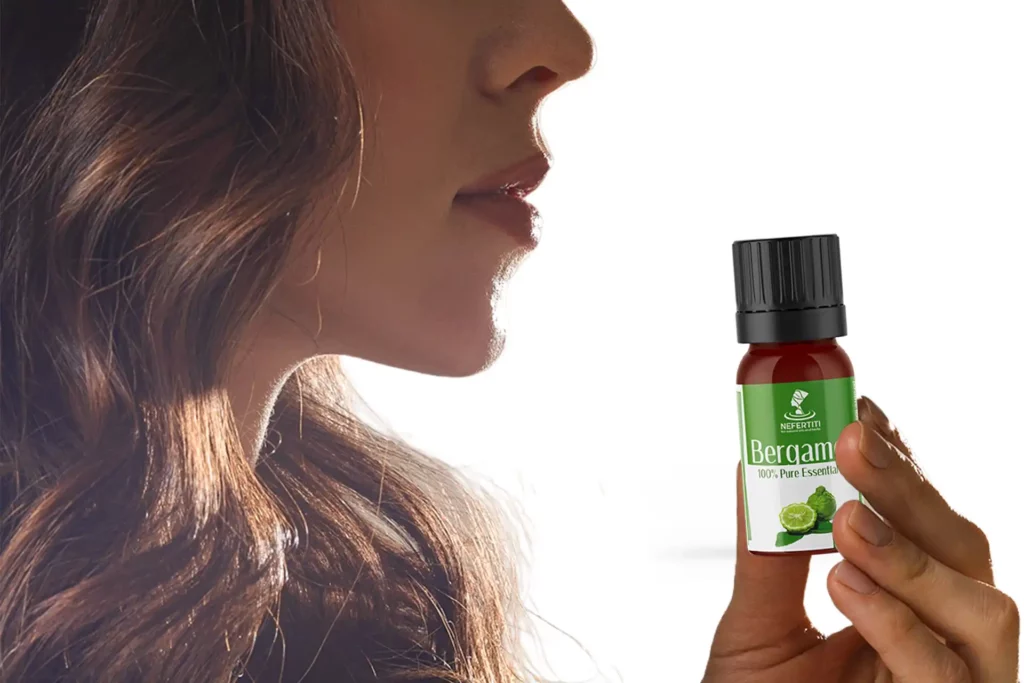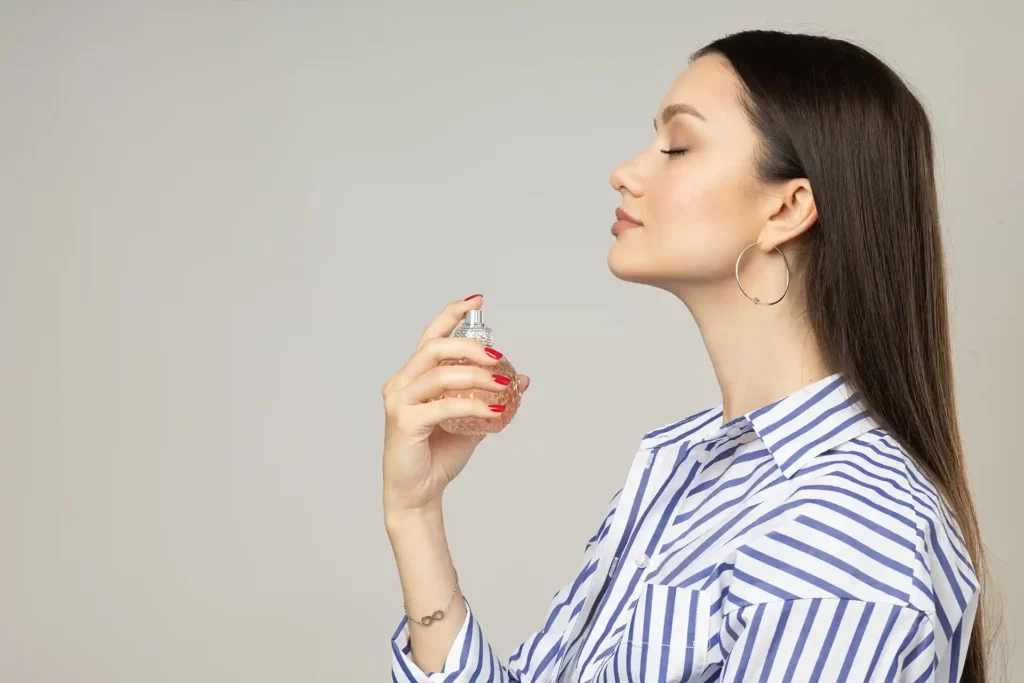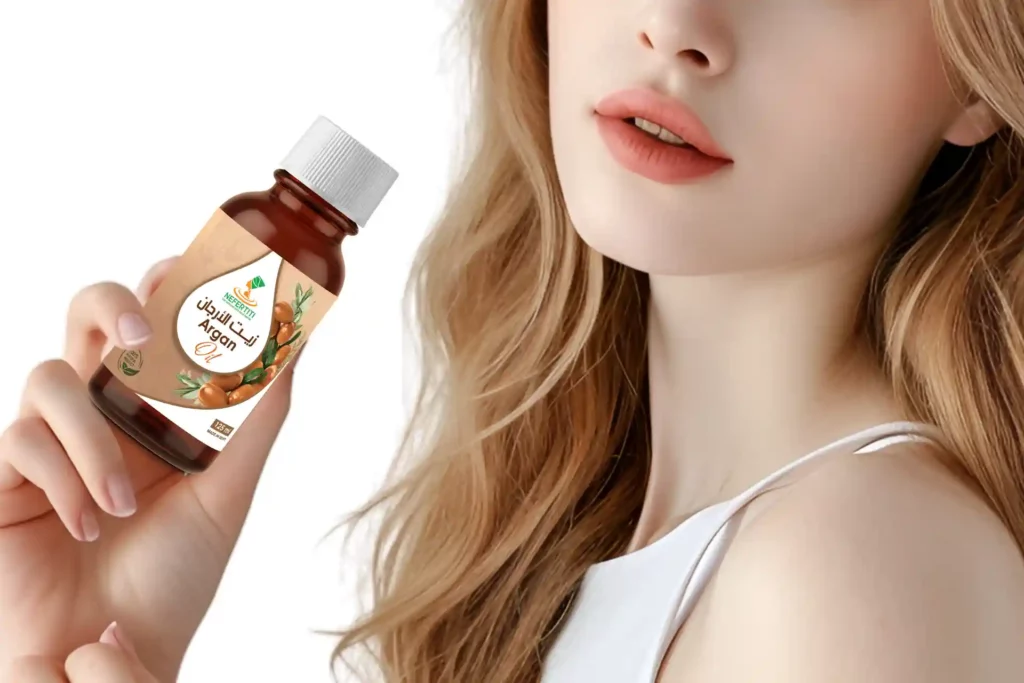 Its said that women are the “weaker sex” but I’m not sure there are many women who would agree with this. Physically maybe, but mentally and for pain endurance, absolutely not! From puberty begins the monthly menstruation, ending with the inevitable menopause, and somewhere in between there is a strong possibility of pregnancy and breastfeeding – each of them bringing their own challenges.
Its said that women are the “weaker sex” but I’m not sure there are many women who would agree with this. Physically maybe, but mentally and for pain endurance, absolutely not! From puberty begins the monthly menstruation, ending with the inevitable menopause, and somewhere in between there is a strong possibility of pregnancy and breastfeeding – each of them bringing their own challenges.
Premenstrual syndrome (PMS) affects at least 3 in 4 women, with some estimates saying as many as 90%. PMS is a combination of physical and emotional symptoms which women experience a week or two before menstruation (after ovulation), which can include mood swings, irritability, depression, fatigue, tender breasts, stomach cramps, headaches, bloating, and more. For many women it’s just an inconvenience, but for others these symptoms can be debilitating, and drastically interfere with their quality of life. Dysmenorrhea (menstrual cramps) also affects many women, and for 20% of women it is so severe that it can interfere with their normal daily activities.
Menopause begins after the depletion of ovarian eggs and the menstrual cycle stops. 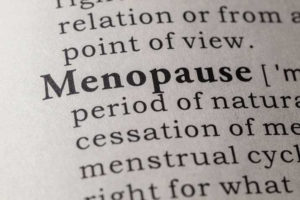 This brings a whole host of new symptoms due to change in hormones during the perimenopause period which may include hot flashes, night sweats, chills, fatigue, sleeping disorders, depression, difficulty concentrating, mood swings, irritability, headaches, heart palpitations, joint stiffness or pain, thinning hair, dry skin, recurrent urinary tract infections, weight gain, loss of libido. On average, the symptoms may last around 4 years, although it’s estimated that 1 in 10 women have symptoms for up to 12 years, although for some the time could be shorter. An estimated 75% of women suffer from hot flashes, although some women may develop only very minor symptoms which do not impact on their quality of life at all.
This brings a whole host of new symptoms due to change in hormones during the perimenopause period which may include hot flashes, night sweats, chills, fatigue, sleeping disorders, depression, difficulty concentrating, mood swings, irritability, headaches, heart palpitations, joint stiffness or pain, thinning hair, dry skin, recurrent urinary tract infections, weight gain, loss of libido. On average, the symptoms may last around 4 years, although it’s estimated that 1 in 10 women have symptoms for up to 12 years, although for some the time could be shorter. An estimated 75% of women suffer from hot flashes, although some women may develop only very minor symptoms which do not impact on their quality of life at all.
For PMS, dysmenorrhea, and menopause symptoms there are various treatments which can be prescribed to help, but is pumping chemicals into our bodies what we really need? Nature has provided us with some wonderfully healing products which every woman should know about, to not just help to alleviate these symptoms but to offer further health benefits as an added bonus. Every woman deserves at least one of these oils in her life:
Fenugreek Oil
Fenugreek contains phytoestrogens which help to stabilise hormone levels, regulate the menstrual cycle and reduce the symptoms and discomfort of PMS, dysmenorrhea and menopause.  It can also help to restore depleted hormone levels after childbirth, increase lactation in nursing mothers, increase libido and enhance the overall look, firmness and even size of the breasts. Balanced hormones will help to support the nervous system and relieve stress. Studies on the effect of fenugreek for the symptoms of PMS, dysmenorrhea, and the menopause have been very favourable.
It can also help to restore depleted hormone levels after childbirth, increase lactation in nursing mothers, increase libido and enhance the overall look, firmness and even size of the breasts. Balanced hormones will help to support the nervous system and relieve stress. Studies on the effect of fenugreek for the symptoms of PMS, dysmenorrhea, and the menopause have been very favourable.
Further health benefits include: boosting the immune system, improving metabolic functioning, cleansing the stomach, intestines, pancreas and kidneys from toxins, improving digestion, limiting blood glucose levels, and improving the performance of the arteries and lowering cholesterol levels, thus reducing the risk of heart or blood pressure problems. It is also known to relieve symptoms of a cold, flu and pulmonary disease, improve the health of skin, scalp and hair, and reduce inflammation and pain to treat ailments such as arthritis.
Pumpkin Seed Oil
Pumpkin Seed Oil can help to restore hormonal balance and promote normal ovulation, thus regulating menstruation and also helping fertility. It helps to reduce the symptoms of PMS, dysmenorrhea and menopause. 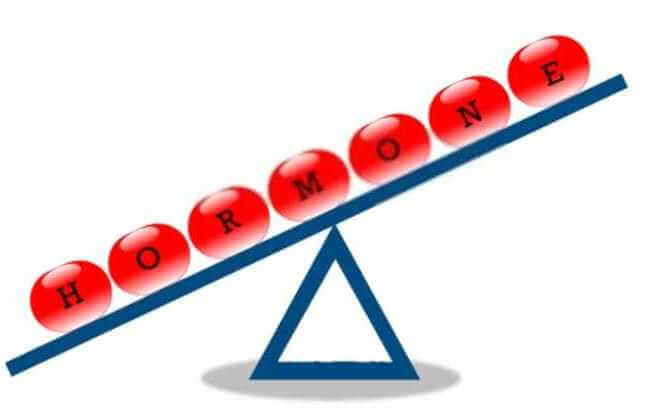 A study on postmenopausal women confirmed that a daily intake of the oil showed that there was a marked decrease in hot flashes, headaches and joint pain. Furthermore the study showed it promoted weight loss, regulated insulin, improved blood pressure and increased good cholesterol levels, thus protecting further against the risk of cardiovascular disease. Pumpkin Seed oil is also said to block dihydrotestosterone (DHT), which is the hormone responsible for hair loss, most noticeably in menopausal and postmenopausal women. Other benefits for women in general is the possibility to prevent stretch marks, especially during pregnancy, treat and prevent an overactive bladder and other urinary disorders, promote sleep, help with skin health and reduce dryness, damage and fine lines and wrinkles, boost the mood and prevent depression, and also help with breast fullness.
A study on postmenopausal women confirmed that a daily intake of the oil showed that there was a marked decrease in hot flashes, headaches and joint pain. Furthermore the study showed it promoted weight loss, regulated insulin, improved blood pressure and increased good cholesterol levels, thus protecting further against the risk of cardiovascular disease. Pumpkin Seed oil is also said to block dihydrotestosterone (DHT), which is the hormone responsible for hair loss, most noticeably in menopausal and postmenopausal women. Other benefits for women in general is the possibility to prevent stretch marks, especially during pregnancy, treat and prevent an overactive bladder and other urinary disorders, promote sleep, help with skin health and reduce dryness, damage and fine lines and wrinkles, boost the mood and prevent depression, and also help with breast fullness.
Overall benefits for the whole family include positive effects on the immune system, urinary and digestive tract, cardiovascular health, protection against metabolic diseases and help with pain management. A Japanese study showed pumpkin seed to significantly reduce incontinence.
Geranium Oil (Pelargonium graveolens)
Sometimes known as “women’s oil”, geranium oil is very beneficial to maintain hormone balance in all stages of a woman’s life, in addition to those suffering from symptoms of the menopause and PMS. A study on the impact of a weekly massage with geranium oil to the abdomen, arms and back of menopausal women, over a period of eight weeks, confirmed the reported improvement of symptoms. The impact of the aroma of geranium oil on menopausal women was investigated in another study and indicated that it may help to stimulate the secretion of salivary estrogen, therefore helping to balance the hormones and eliminating symptoms associated with reduced estrogen, such as mood swings, depression, sleeping disorders, hot flashes and pain. It is also very useful to alleviate the symptoms of PMS, improving depression and anger and restoring mental and metabolic balance, promoting blood circulation, relieving cramps and reducing bloating and breast tenderness. Studies regarding geranium oil for the symptoms of PMS by inhalation and massage have been very promising. 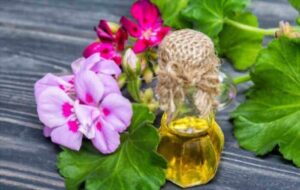 Geranium oil is also reported to provide emotional support, and can be extremely beneficial following a miscarriage, and to protect against postnatal depression. A study also showed that inhalation of geranium oil during labour helped to decrease anxiety levels. This wonderful oil is also a powerful aphrodisiac and can boost your energy levels. Used in skin care geranium oil is known for its ability to tighten the skin and reduce the appearance of fine lines and wrinkles, and prevent sagging skin and muscles. It is also an excellent remedy for acne and breakouts, dermatitis and other inflammatory skin problems, and can accelerate wound healing and reduce scarring.
Geranium oil is also reported to provide emotional support, and can be extremely beneficial following a miscarriage, and to protect against postnatal depression. A study also showed that inhalation of geranium oil during labour helped to decrease anxiety levels. This wonderful oil is also a powerful aphrodisiac and can boost your energy levels. Used in skin care geranium oil is known for its ability to tighten the skin and reduce the appearance of fine lines and wrinkles, and prevent sagging skin and muscles. It is also an excellent remedy for acne and breakouts, dermatitis and other inflammatory skin problems, and can accelerate wound healing and reduce scarring.
Additional benefits of geranium oil are the result of its potent anti-inflammatory properties, such as the treatment of foot and leg swellings caused by oedema, reducing nerve pain (particularly for the relief of shingles), reducing neuroinflammation which may be beneficial for neurodegenerative diseases such as Alzheimer’s, Parkinson’s and multiple sclerosis, and reducing allergic reactions. It is also helpful to prevent and treat bacterial infections and is effective against staphylococcus aureus, may reduce blood sugar levels, and improves the urinary gland, thus flushing toxins from the body. Its “feel good” aroma helps to diminish depression.
Please note that this oil should never be taken internally. Nor should it be applied directly to the skin, but must be diluted with a carrier oil.
Jasmine Oil
Although being predominantly a woman’s oil, Jasmine has the unlikely title of “King of Oils”. The name is derived from the Persian word yasmin – “a gift from God”, which is exactly what this oil has been to women for centuries. Jasmine oil can balance the hormones and regulate the menstrual cycle, bringing relief to PMS, dysmenorrhea and menopause symptoms. Studies have confirmed its usefulness for this. It is also known to protect the uterus, by promoting the production of certain hormones to ensure its good health and proper functioning, and is reported to protect against tumour growths which may be more common after menopause. 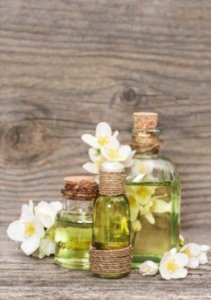 Jasmine oil has a long history of use within childbirth. It is said to strengthen contractions during delivery and speed up the birth, whilst also reducing labour pains and decreasing recovery time and pain. Jasmine oil can also increase milk secretion in nursing mothers, and protect against postnatal depression, in addition to reducing the appearance of stretch marks. Not to mention the fact that jasmine oil is well known for its use as a powerful aphrodisiac, hence its other nickname of “queen of the night”. Studies have shown it causes marked increases in heart and breathing rate, body temperature and blood pressure – all definitive signs of physical arousal.
Jasmine oil has a long history of use within childbirth. It is said to strengthen contractions during delivery and speed up the birth, whilst also reducing labour pains and decreasing recovery time and pain. Jasmine oil can also increase milk secretion in nursing mothers, and protect against postnatal depression, in addition to reducing the appearance of stretch marks. Not to mention the fact that jasmine oil is well known for its use as a powerful aphrodisiac, hence its other nickname of “queen of the night”. Studies have shown it causes marked increases in heart and breathing rate, body temperature and blood pressure – all definitive signs of physical arousal.
Jasmine oil is a natural remedy for fatigue, insomnia, anxiety, stress and depression. It can increase energy, alertness and a positive state of mind, in addition to having a calming effect. This oil is antiseptic, antibiotic and antiviral, effective against e.coli, l.casei, s.mutans and candida, and is helpful for the general skincare, plus the treatment of skin conditions, including psoriasis, and for accelerating the healing of wounds and diabetic ulcers, and reducing scarring. Jasmine oil can also help to relieve cramps and spasms.
Please note that this oil should never be taken internally. Nor should it be applied directly to the skin, but must be diluted with a carrier oil.
Rose Oil
Rose oil is alleged to act as a tonic and strengthen the uterus. Certainly, rose oil helps to balance the hormones, ease heavy periods, and regulate the menstrual cycle. It is proven to have powerful anti-inflammatory and pain relief properties and in studies reduced the severity of dysmenorrhea. Research has also indicated that rose oil may be effective in helping to balance the hormones during the menopause, alleviating symptoms such as mood swings, anxiety, night sweats, hot flushes, low libido and pain. The invigorating scent of rose is an aphrodisiac in itself. Add that to the anxiety reducing properties, that it increases blood circulation, and its ability to balance sex hormones, and you’ve found a potent aid to reduce sexual dysfunctions including frigidity and erectile dysfunctions. Two studies indicated that inhaling the aroma increased sexual satisfaction and desire. A further study confirmed that it significantly improved sexual function in women undergoing the menopause. For pregnancy, this oil can help to reduce pain during labour, alleviate postnatal depression, and reduce the appearance of stretch marks. 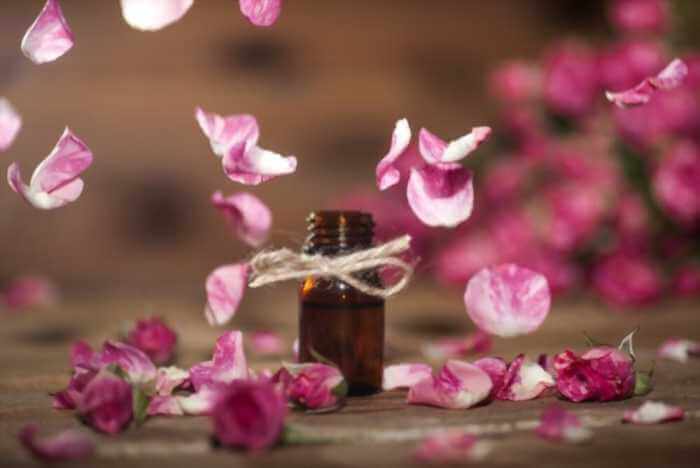 Rose oil has been proven to be an extremely potent antidepressant, it helps to reduce the heart rate and blood pressure, calms and relieves stress and anxiety, and boosts self-esteem. This wonderful oil is a valuable aid to skin care, it relieves skin irritations, helps with conditions such as eczema, rosacea and psoriasis, rehydrates dry skin, clears acne, reduces signs of ageing, and is suitable for all skin types, even the most sensitive. It can heal small cuts and abrasions, and diminish scarring, dark spots and dark circles under the eyes. Rose oil can effectively help to relieve aches and pains, stimulate circulation, enhance memory and sleep, in addition to great benefits for the hair. Rose Oil is particularly beneficial for the relief of rheumatism, arthritis and gout.
Rose oil has been proven to be an extremely potent antidepressant, it helps to reduce the heart rate and blood pressure, calms and relieves stress and anxiety, and boosts self-esteem. This wonderful oil is a valuable aid to skin care, it relieves skin irritations, helps with conditions such as eczema, rosacea and psoriasis, rehydrates dry skin, clears acne, reduces signs of ageing, and is suitable for all skin types, even the most sensitive. It can heal small cuts and abrasions, and diminish scarring, dark spots and dark circles under the eyes. Rose oil can effectively help to relieve aches and pains, stimulate circulation, enhance memory and sleep, in addition to great benefits for the hair. Rose Oil is particularly beneficial for the relief of rheumatism, arthritis and gout.
Please note that this oil should never be taken internally. Nor should it be applied directly to the skin, but must be diluted with a carrier oil.
Natural remedies have taken a backseat over the past century as huge conglomerates pay a ransom in advertising for their chemically enhanced products, all labelled as ‘miracle cures’ but mostly unable to live up to the hype. Mother Nature needs no advertising – these oils have been tried and tested by women for millennia, with no harmful side effects. Today more and more women are making an informed choice to switch to natural products and limit the amount of toxins which they expose their bodies to.
Which one of these indispensable multifunctional oils will you add to your collection of wellness products?



